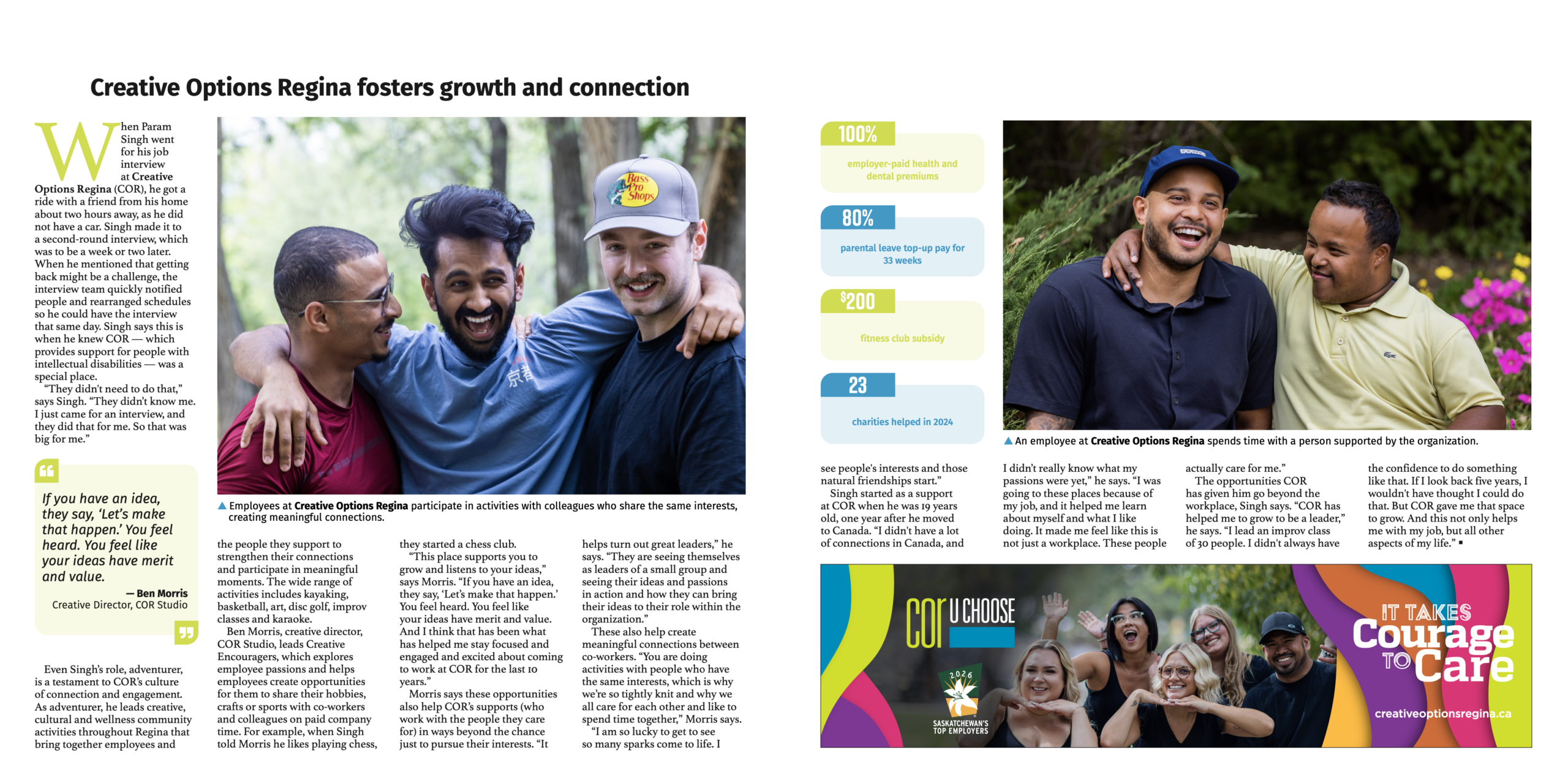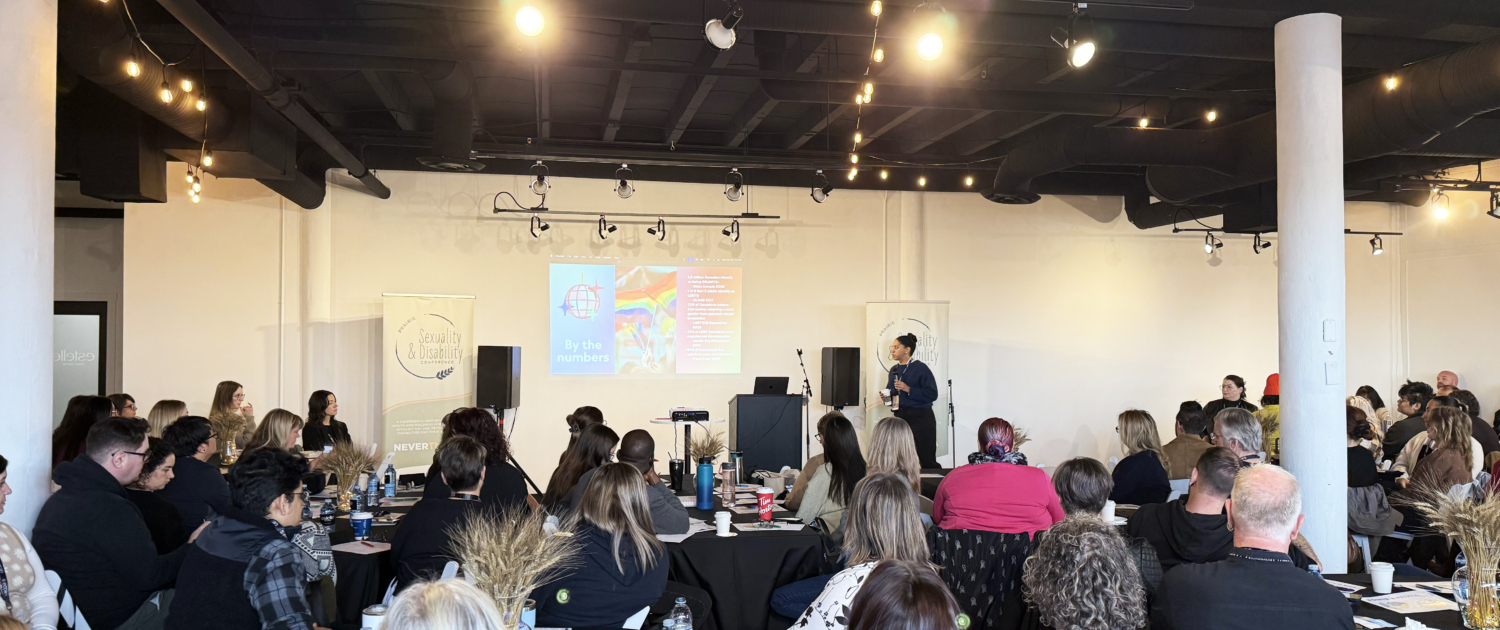COR is honoured to be named one of Canada’s Top 100 Employers for 2026, a national recognition of our continued efforts to build a workplace rooted in compassion, innovation and a culture of gentleness. This milestone reflects our deep commitment to supporting not only the people we serve, but also the people who stand beside them every day.
This year’s award, presented by Mediacorp Canada Inc., highlights organizations that have embraced disruption (economic uncertainty, demographic shifts, and the rise of AI) as opportunities to lead with vision and humanity. COR is honoured to be recognized among forward-thinking organizations that are investing in people to build long-term resilience and purpose.
“True organizational strength comes from human connection,” said COR CEO Michael Lavis during the awards reception. “Caregiving is not a one-way act of service – it is a shared human experience. And if we are to ask people to care deeply, we must ensure they are deeply cared for in return” .

A Mission Grounded in Belonging, Compassion and Community
At COR, our mission is clear: To foster a culture of belonging, where every person (supported or supporting) feels valued, connected and empowered.
We support youth and adults experiencing intellectual disability and mental health challenges through personalized services rooted in dignity and respect. But our deeper aim is to transform how care is experienced – for those receiving it, and equally for those providing it.
This philosophy shapes every aspect of our workplace culture. It is reflected in how we show up for one another, create emotionally safe environments, and design systems that prioritize the well-being of our teams – not just in policy, but in practice.
Leading with Gentleness, Investing in People
In recent years, as much of the care sector faced instability, COR chose a different path – deepening wellness supports, expanding parental leave, and launching Virtual Health Care to ensure our team could access the support they needed. These weren’t add-ons, they were essential actions aligned with our core value: care for those who care for others .
We also established the COR Academy to extend our leadership approach beyond our organization, equipping other communities and care providers across Canada with tools to lead with gentleness, empathy, and inclusion .
Looking Ahead
COR’s inclusion in Canada’s Top 100 Employers is not just a reflection of where we are; it’s a reaffirmation of where we’re going. We remain committed to challenging conventional models of care, investing in our people, and cultivating workplaces where everyone feels they belong.
We thank Mediacorp for this recognition and salute our peers across Canada who continue to redefine what it means to lead through humanity, integrity and bold vision.
To our team, our community, and our partners – THANK YOU.
Let’s keep building, together.

The full list of Canada’s Top 100 Employers (2026) was announced in a special magazine published online in The Globe and Mail and on Eluta.ca. Detailed “Reasons for Selection,” along with hundreds of stories and photos highlighting winning initiatives, are available on the competition homepage.
Canada’s Top 100 Employers
2026 Winners
Alberta Blue Cross, Edmonton AB
APTN, Winnipeg MB
AstraZeneca Canada Inc., Mississauga ON
Audiokinetic Inc., Montréal QC
Bank of Canada, Ottawa ON
BASF Canada Inc., Mississauga ON
BC Hydro, Vancouver BC
BC Public Service, Victoria BC
BDO Canada LLP, Toronto ON
BHP Canada Inc., Saskatoon SK
Bird Construction Inc., Calgary AB
Blake, Cassels & Graydon LLP, Toronto ON
Boston Consulting Group Canada ULC, Toronto ON
British Columbia Investment Management Corp. / BCI, Victoria BC3
Business Development Bank of Canada, Montréal QC
Canada Energy Regulator, Calgary AB
CBCL Limited, Halifax NS
CIBC, Toronto ON
Clio, Burnaby BC
College of Physicians and Surgeons of Ontario, Toronto ON
Co-operators Group Limited, The, Guelph ON
Creative Options Regina, Inc., Regina SK
Danone Canada, Boucherville QC
Dash Social, Halifax NS
Dentons Canada LLP, Calgary AB
Desjardins Group / Mouvement Desjardins, Lévis QC
Diamond Schmitt Architects Inc., Toronto ON
Digital Extremes Ltd., London ON
DP World (Canada) Inc., Burnaby BC
Emera Inc., Halifax NS
Equinix, Inc., Toronto ON
ETRO Construction Ltd., Burnaby BC
Export Development Canada, Ottawa ON
EY, Toronto ON
Fidelity Canada, Toronto ON
Ford Motor Company of Canada Ltd., Oakville ON
GHD Ltd., Waterloo ON
Gibson Energy Inc., Calgary AB
Graham Construction, Calgary AB
Hatch Ltd., Mississauga ON
Henkel Canada Corp., Mississauga ON
Hospital for Sick Children, The, Toronto ON
IGM Financial Inc., Winnipeg MB
Innovation, Science and Economic Development Canada, Ottawa ON
Inter Pipeline Ltd., Calgary AB
Irving Oil, Saint John NB
Keurig Dr Pepper Canada, Montréal QC
Keyera Corp., Calgary AB
Labatt Breweries of Canada, Toronto ON
LBMX Inc., London ON
Lightspeed Commerce Inc., Montréal QC
Loblaw Companies Ltd., Brampton ON
L’Oréal Canada Inc., Montréal QC
Manulife Financial Corporation, Toronto ON
Mars Canada, Bolton ON
Mawer Investment Management Ltd., Calgary AB
Mazda Canada Inc., Richmond Hill ON
Medavie Inc., Moncton NB
Michelin North America (Canada) Inc., New Glasgow NS
Nasdaq Verafin, St. John’s NL
Nestlé Canada Inc., North York ON
Novo Nordisk Canada Inc., Mississauga ON
Office Interiors, Dartmouth NS
Plusgrade Inc., Montréal QC
Pomerleau Inc., Montréal QC
Procter & Gamble Inc., North York ON
Provincial Credit Union Ltd., Charlottetown PE4
Rio Tinto, Montréal QC
Roche Canada, Mississauga ON
Royal Bank of Canada, Toronto ON
Samsung Electronics Canada Inc., Mississauga ON
SAP Canada Inc., Vancouver BC
SaskEnergy Incorporated, Regina SK
Schneider Electric Canada Inc., Mississauga ON
Scotiabank, Toronto ON
Seaspan, North Vancouver BC
Second Harvest Canada, Etobicoke ON
SEKISUI Diagnostics P.E.I. Inc., Charlottetown PE
Shell Canada Limited, Calgary AB
Simon Fraser University, Burnaby BC
Smith Bros. & Wilson, Surrey BC
Sobeys Inc., Mississauga ON
StandardAero Ltd., Winnipeg MB
Statistics Canada / Statistique Canada, Ottawa ON
Stryker Canada ULC, Waterdown ON
Teck Resources Limited, Vancouver BC
Thales Canada Inc., Nepean ON
TMX Group Limited, Toronto ON
Toyota Motor Manufacturing Canada Inc. / TMMC, Cambridge ON
UAP Inc., Montréal QC
United Way British Columbia, Burnaby BC
Université de Montréal, Montréal QC
University of New Brunswick / UNB, Fredericton NB
Vale Base Metals, St. John’s NL
Vancouver City Savings Credit Union, Vancouver BC
Vancouver Coastal Health, Vancouver BC
West Fraser Timber Co. Ltd., Vancouver BC
World Vision Canada, Mississauga ON
WSP Canada Inc., Montréal QC
Yukon, Government of, Whitehorse YT





















































































